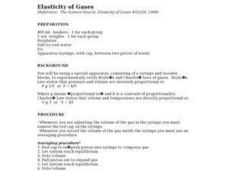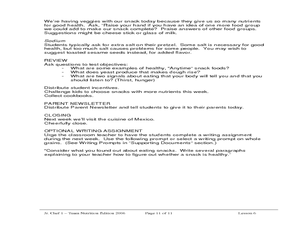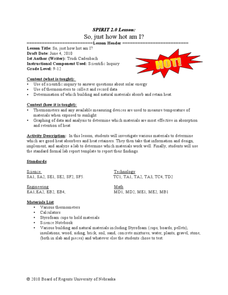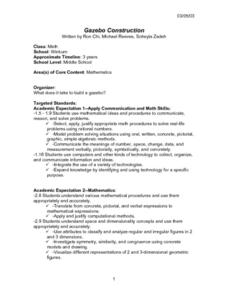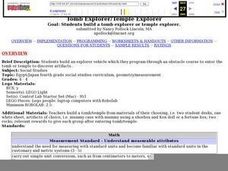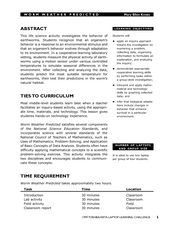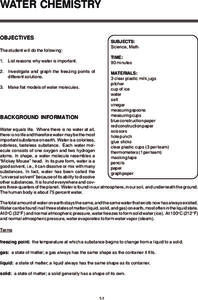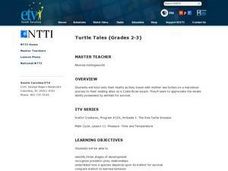Teach Engineering
Equal and Opposite Thrust in Aircraft: You're a Pushover!
It's the law—every action requires a reaction, no matter how small. Pupils experience two demonstrations of Newton's third law of motion as it relates to thrust in the 10th segment of a 22-part unit on flight. Using their mathematical...
Curated OER
Elasticity of Gases
Students investigate gas laws and apply them in experimental conditions. Using an apparatus composed of a syringe and wooden blocks, they experimentally verify Boyle's and Charles' laws of gases.
Curated OER
When Disaster Strikes! Rocks, Minerals, Erosion and Weather
Students pretend the area they live in is subject to wind, waves and rain. In groups, they pretend they are a groups of meteorologists or geologists and are to report on the weather and damage that could occur there. Each group develops...
Curated OER
Gravity (Newton's Laws of Motion): A Weighty Subject
Students identify Newton's Laws of Motion. They students explore Newton's Laws of Motion and apply the second law with a classroom activity. The videos will provide visual examples of the effects of gravity while riding on a roller coaster.
Curated OER
Your Own Fresh Water Aquarium in the Classroom
Students explore aquariums. In this fish and ecosystems lessons, students establish a freshwater aquarium environment using materials provided. Students read about and care for the classroom fish.
Curated OER
My Car Has Potential
Seventh graders investigate how changes in the mass or height of a ramp can affect the change in potential energy. They discuss the concepts of work and energy, then using the four question strategy, they design an experiment that...
Curated OER
Why is it so hot when I sit next to the window?
Students investigate how energy travels through glass. In this energy usage lesson, students conduct an experiment in which they decide if window film affects how much energy travels through the glass. Students use a journal to make...
Curated OER
Jr. Chef Club Super Snacks Lesson 6
Students explore healthy snacks. In this nutrition and cooking lesson, students observe and identify food groups on USDA's MyPyramid food guide. Students discuss how fiber helps our digestive system and follow a recipe using yeast to...
Curated OER
So, just how hot am I?
Students design a lab demonstrating the scientific method. For this earth science lesson, students investigate different materials for their heat absorbing property. They report their findings in class.
Curated OER
Get to know H2O!
Students investigate scientific concepts and inquire about physical states of matter. The transition of water is considered and is easy to facilitate because of its abundance and often observed physical changes.
Curated OER
Marshland Wonders
Students review the characteristics of wetlands and list their benefits. After viewing short videos, they identify the organims that make their home in wetlands and how they have adapted. They compare and contrast the characteristics...
Curated OER
Gazebo Construction
Students create and give oral proposals for the construction of a gazebo using a blueprint created with Geometer's Sketchpad. They then build a gazebo model using the blueprints created and provide evidence why it should be selected for...
Curated OER
Tomb Explorer/Temple Explorer
Fourth graders build an explorer vehicle which they program through an obstacle course to enter the tomb or temple to discover artifacts.
Curated OER
ABOUT ALL YOU CAN EAT: Superfoods
Students trace back through time to see how the nutritional value of food consumed was enhanced. In this nutrients lesson students complete several activities that show the mass of food, and its PH value.
Curated OER
PLANETS IN PROPORTION
Students discover scales for both the solar bodies' relative sizes and their distances from the sun. They find equatorial circumference and volumes of their solar bodies. Students apply estimation strategies and proportioanl reasoning to...
Curated OER
Watching the Weather
Students examine the weather. They discover the conflict between man and nature caused by the changes in weather and the impact it has upon their lives. Students explore weather folklore. They write a report on the weather. ...
Curated OER
Comparison of Snow Cover on Different Continents
Young scholars use the Live Access Server (LAS) to form maps and a numerical text file of snow cover for each continent on a particular date. They analyze the data for each map and corresponding text file to determine an estimate of snow...
Curated OER
Worm Weather Predicted
Students examine worm habitats. In this animal habitats lesson, students participate in a lab activity that requires them to explore the adaptations that earthworms make to their environment.
Curated OER
Weather or Not
Sixth graders explore weather. In this meteorology instructional activity, 6th graders create weather instruments and compare and contrast weather data.
Curated OER
WATER CHEMISTRY
Students list reasons why water is important and investigate and graph the freezing points of different solutions.
Curated OER
TE Activity: Stream Consciousness
Fourth graders study how environmental engineers monitor water quality. They use environmental indicators to determine the quality of stream water in their area. They count the number of macroinverabrates and use the information they...
Alabama Learning Exchange
Density
High schoolers observe a demonstration of regular soda versus diet soda. In this exploring density instructional activity students complete a lab on density and present a PowerPoint presentations of their results.
Curated OER
Introduction to Topographic Maps
Tenth graders create a topographic map and see how it represents different elevations. In this topographic maps lesson students read and interpret topographic maps.
Curated OER
Turtle Tales
Students watch videos and fill out worksheets about the turtles and their journey to the Costa Rican beach. In this turtles lesson plan, students learn and discuss survival, predator and prey, and stages of development.



